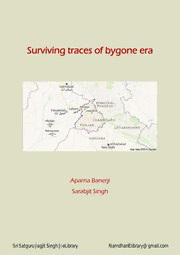
Surviving Traces Of Bygone Era PDF
Preview Surviving Traces Of Bygone Era
Surviving traces of bygone era Aparna Banerji Sarabjit Singh Sri Satguru Jagjit Singh Ji eLibrary [email protected] Sri Satguru Jagjit Singh Ji eLibrary [email protected] Surviving traces of bygone era Tribune correspondent Aparna Banerji and lensman Sarabjit Singh chance upon a treasure trove of items conserved at the home-museum of farmer Surinder Singh Khalsa, which is a living celebration of Punjab, its folklore and ‘mehnatkash virsa’. Sri Satguru Jagjit Singh Ji eLibrary [email protected] Agricultural implements made of wood and iron put on display on the upper shelves of the museum. The farm implements depict the journey of Indian agriculture and its development from past to modern era. There was a time when villages in Jalandhar and Phagwara perched atop sand dunes, camels roamed the village by-lanes as the bells in their neck collars tinkled and granthis and mahants visited homes doling out wisdom and women embroidered Phulkari for their dowries. The dunes are gone, replaced by metalled streets and Sri Satguru Jagjit Singh Ji eLibrary [email protected] concrete structures, but there is a place where the remnants of the bygone era can still be found. Surinder Singh Khalsa holds a fatti, a wooden writing board. The writing on the fatti is of his son Sahibzada Singh. Sri Satguru Jagjit Singh Ji eLibrary [email protected] At nondescript Khajurla village, a few kilometres away from the plush, touristy restaurants along the Jalandhar-Chandigarh highway, is a hidden treasure — a home-museum conserved by A Sikh scholar and farmer Surinder Singh Khalsa. It is a living celebration of Punjab, its folklore and ‘mehnatkash virsa’ (culture of hard work). Portrait of village elders kept at the library. Sri Satguru Jagjit Singh Ji eLibrary [email protected] The home hosts a museum “Ajaib Ghar”, a rich library celebrating Sikh and Hindu texts, books and scholars, farm implement exhibits, a special enclosure dedicated to the farmers’ protest on the Singhu border (where Surinder Singh camped all through), and a traditional kitchen, where lies a clay chulha. Old mirrors, brass plates, iron press, brass cutlery, baskets and candle preserved at the museum. Sri Satguru Jagjit Singh Ji eLibrary [email protected] He has preserved the precious belongings of seven generations of the men and women of his family and many villagers (who handed their heirloom to him for safekeeping). A vintage wooden Coral Super TV, radios and tape recorders preserved at the museum along with an array of vintage LP records (seen in the photo is a record featuring Mohammad Sadiq and Ranjit Kaur along with Kartar Singh Ramla and Sukhwant Kaur) and antique record players. Sri Satguru Jagjit Singh Ji eLibrary [email protected] He says, “Guru Granth” (The Granth be thy Guru) has been the reigning philosophy in the household. Baba Beer Singh was our first ancestor to head abroad. My grandfather Jagat Singh, his younger brother Niranjan Singh and uncles Mahinder Singh and Darshan Singh have all visited countries like Canada, Argentina, Hong Kong, Singapore, France, etc. But their siddhant (tenets) remained rooted in Sikhism.” Dated and historic coins preseved at the museum Sri Satguru Jagjit Singh Ji eLibrary [email protected] Valuable items have been named after “Mai Bholi Di peerhi” (Mai Bholi was Surinder’s great grandmother), Maji Bant Kaur (grandmother) da Sanddok. “Bibi Surinderjit Kaur (Surinder Singh’s mother) di tokri” — hand-made baskets made with wheat straw (Kanak diyan naaran) — are prized possessions. “Odon kankan vi lammiyan hundiyan si (back then, the wheat crop was taller),” Khalsa reminisces. Doors, beds, chairs and even roof rafters all have been reclaimed from ancestral properties or women’s trousseaus. Sri Satguru Jagjit Singh Ji eLibrary [email protected]
